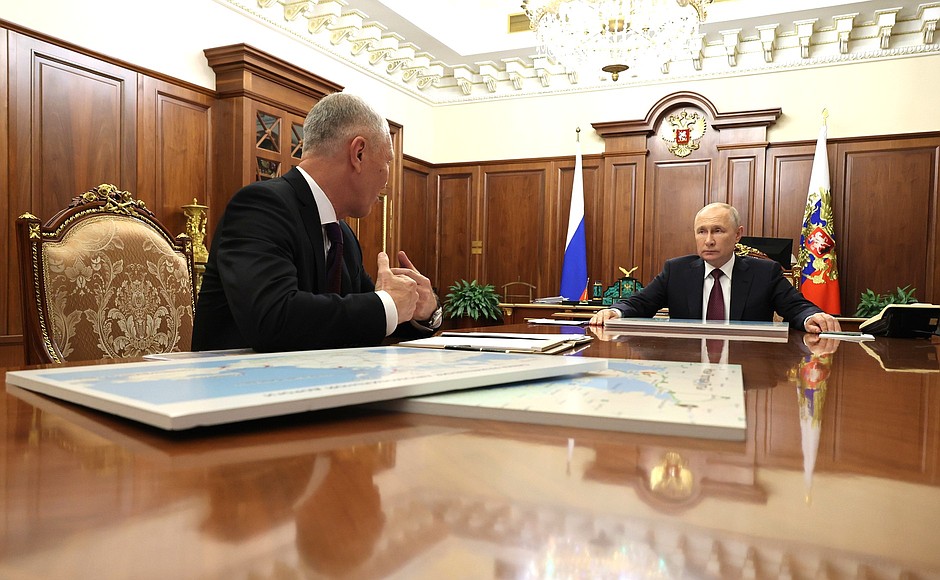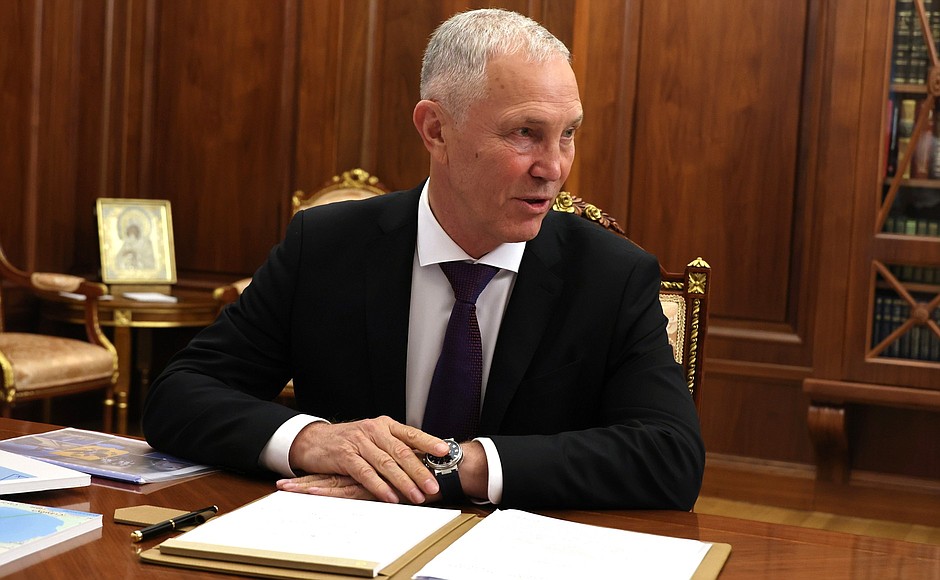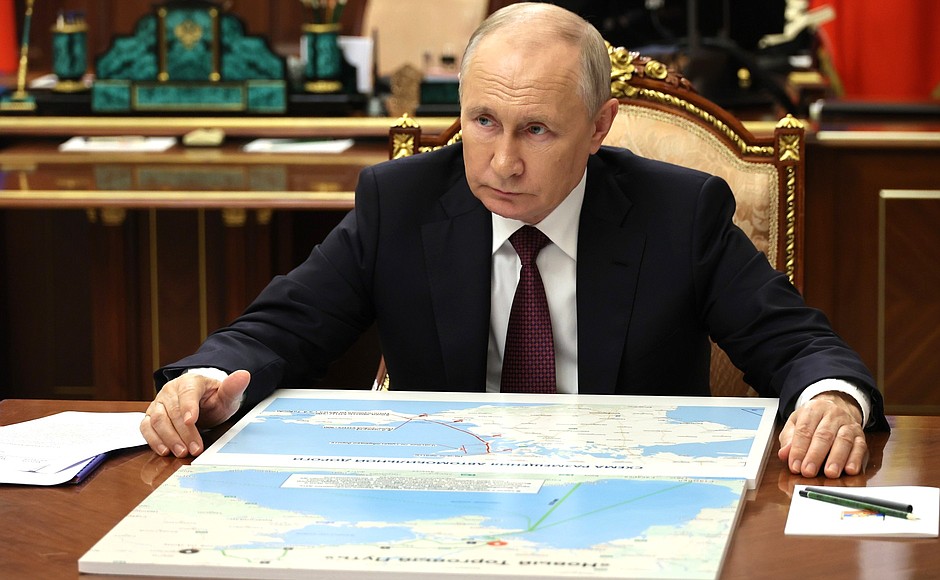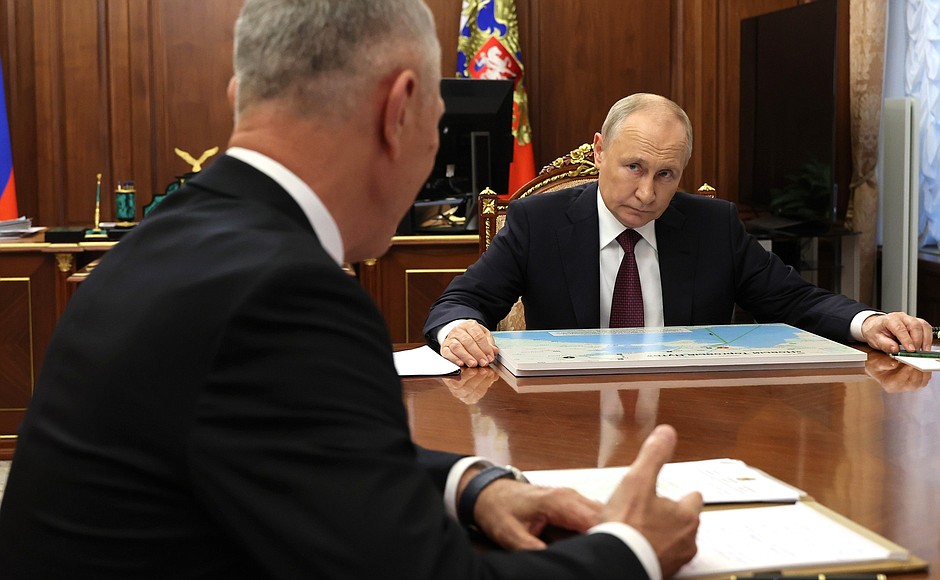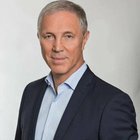President of Russia Vladimir Putin: What shall we start with, Mr Saldo?
Acting Governor of the Kherson Region Vladimir Saldo: I will first report on our work.
Yesterday, we had a working group meeting chaired by Mr Marat Khusnullin. We discussed the final efforts on disaster recovery after the Kakhovka Dam failure. This was a despicable act by the Kiev authorities. They knew this would not give them any military advantages, but they did it anyway.
Mr President, in just two months, regional and local agencies and departments, without exception, have basically managed to mitigate the consequences of this enormous disaster through their concerted efforts. All this was done in the lower reaches of the Dnieper. There are 17 villages in the 15 kilometre zone along the Dnieper where the river flows in its natural bed. Absolutely everything has been restored – electricity and gas distribution, roads that were washed away, and communications. As a result, people have started coming home.
Vladimir Putin: God willing.
Mr Saldo, you must certainly consider each family’s case. I would like to ask you to take an individualised approach, because each specific case – I have seen this many times in emergency situations – each specific case has its own nuances.
Vladimir Saldo: I agree. People have received more than 300 million rubles in aid, including 10,000-ruble payments, 50,000, and 100,000-ruble payments depending on the amount of damage.
Mr President, when this happened, people went into a state of shock at first, but then, thanks to this work, to this help, we felt a strong shoulder, the support of a strong family, and people simply waited for the water to subside, and began to return to the area and restore their homes themselves. This disaster rallied us together even more, and we became even more confident that Russia is a great country that leaves no one behind.
Therefore, thanks to you keeping this under review – you never stopped calling, asking, and checking – thanks to the well-coordinated work and absolutely everyone’s involvement, the entire Presidential Executive Office was very dedicated.
Finally, a decision was made yesterday to lift the state of emergency. The status of a local emergency remains – it was at the federal level until recently, and now it is a local emergency; we will keep it in a 15-kilometre zone. In general, the work is done. Thank you so much.
Vladimir Putin: We need to help the people rebuild their homes, because all right, the money is good, but there are other issues when it comes to building materials, transport, and a lot of things. There are probably a lot of questions about the documents.
Vladimir Saldo: Many documents were lost.
Vladimir Putin: That is what I am saying. Therefore, you just need to carefully approach each case, each family.
Vladimir Saldo: Thank you.
People send you their regards. Whenever I visit, or go outside, the first thing I hear is words of support. No one asks for anything. We will manage, they say, just give us the materials.
Vladimir Putin: Yes, I know.
Vladimir Saldo: We lost 57 people who drowned. Fifty-seven deaths. The others were found, but the disaster still claimed 57 lives.
Vladimir Putin: It is imperative to help the families of the victims.
Vladimir Saldo: Yes. According to your executive order, we are authorised to provide assistance to the families of the deceased.
Vladimir Putin: You just make sure that the money reaches the recipients, because there are a lot of executive orders, but they do not always work.
What happened with the station?
Vladimir Saldo: Right now, it is almost too painful to look at, I must admit, and I know it pains you, too – you called immediately, in the first days, on June 6, when it happened.
The power station is as good as wiped out, and the dam is washed out. But from an engineering perspective, it is repairable, like everything else, but obviously, rebuilding it will not be possible until after the cessation of active hostilities. As it is, the shelling continues, and the other side behaves in the most brazen way: small FPV drones drop grenades even on cars.
But they can be dealt with now – our military as well as the services whose job it is to deal with them have already found an antidote. The simplest solutions work sometimes, and the people are savvy – both the military and paramilitary units. We have the Margelov volunteer battalion – the command praises what they do – so, they have found how to deal with these drones: when they fly lower, they can be simply shot down with ordinary small arms, like a hunting rifle.
We have a problem to solve that is going to be a real challenge in eight to nine months. When the water level lowered, the Dnieper returned within its banks. Over the years that the Kakhovskya dam was operating, there was the Kakhovka reservoir, and most of the villages and towns upstream from the dam used the water available due to a higher level of underground waters. There is also the land reclamation system, and it remained intact.
Today, there is still water in the Kakhovka and North Crimean canals, and this water is being used to supply the communities. But, according to estimates, there is only enough water for eight months.
Land surveying is being carried out, and temporary options are being explored. Anyway, all the structures will be rebuilt eventually, but before they are, we are exploring the possibilities of extracting water from other layers. Geologists are working, looking for options to drill wells, transfer the water and supply the communities.
Therefore, I have one request. May I?
Vladimir Putin: Yes, of course.
Vladimir Saldo: A plan for the socioeconomic development of the Kherson Region was approved last spring, and there is also a federal project, Clean Water, which includes this work. But because the situation is… You know about the world-famous Askania-Nova Nature Reserve, with the Institute of Animal Husbandry, and the village of Askania-Nova, about 6,000 people. A water supply system was built there a long time ago using asbestos-cement pipes and couplings. Those materials are no longer allowed for use under the modern SNiP construction standard. It is all overgrown, and we are trying to repair it now, but it is too difficult.
My request is to speed up this process. The costs are reasonable, and I spoke with Mr Marat Khusnullin. I have asked to speed up the process so that it can be done this year.
Vladimir Putin: All right, we will look at it.
Excuse me, what is this map you have?
Vladimir Saldo: I would like to move on to long-term planning.
Considering that the grain deal is not working right now, we propose reviving the trade route we used back when I served as mayor of Kherson. In 2007, we connected Skadovsky, a Black Sea port, to Zonguldak, Turkiye, and on to Istanbul using a ferry crossing. Over 1,200 foreign ships entered this port.
These ferries took heavy trucks with TIR Carnets on board. The only other option for these trucks was to drive all the way around the Black Sea, but this way they were only 295 miles away from Zonguldak.
Zonguldak is Kherson’s twin city. In fact, this is the only city in Turkiye that produces hard coal. It has mines, and there is a port there too.
If we revive this ferry crossing and make it operational, this will give us new trade routes we never had before, since the crossing takes very little time, just 20 hours. I have used this ferry line to sail across the Black Sea and visit Zonguldak. This way, we can use the roads you can see here to cover this section…
By the way, I am proud to report that we have already harvested 1.5 million tonnes of grain.
Vladimir Putin: That is a lot.
Vladimir Saldo: The soil yields its fruit one way or another, but you must deliver them somewhere. This is a direct route I wanted to show you ahead of your meeting with the President of Turkiye, so that you can raise this topic with him.
Vladimir Putin: All right.
Vladimir Saldo: This proposal covers much more than just about our region.
Vladimir Putin: I see. It has a regional dimension. What do we have here on the map?
Vladimir Saldo: This is the second part of my development proposal. What you see here is the Arabat Spit. We started building office buildings and other structures there in keeping with your instructions.
Almost all the buildings there are nearing completion. The only problem is that when we embarked on this effort, this territory was not exposed to missile strikes. Now there are the Storm Shadow missiles which can reach this area, and we have already had incoming strikes.
What do we suggest? Our proposal is to build a road along the Arabat Spit. After all, it links us to Crimea, which is 130 kilometres away if you follow the spit.
A company came forward with a proposal to build the road without using any state funds by launching a concession under Federal Constitutional Law 105. We suggest supporting their bid, since they are not asking for any budget allocations.
Vladimir Putin: Of course, we must review the environmental impact.
Vladimir Saldo: We have already done that. There is already a road there all the way up to Strelkovoye, but the spit then becomes too narrow, and all this sand, so we use the mainland road.
Vladimir Putin: The road is already there, so it is a question of bringing it up to standard.
Vladimir Saldo: Yes.
The military use it right now, and I will tell you how we work with them later.
Vladimir Putin: Good.
Vladimir Saldo: I also have this letter and ask for your support.
Vladimir Putin: All right.
Vladimir Saldo: There is also a recreational zone within the cluster. We will develop it.
A few words about the elections.
Vladimir Putin: Yes, of course.
Vladimir Saldo: Yes, a few words about the elections. Preparations are in progress for the electoral process itself. Once again, Mr President, support for [your candidacy] is growing. It dropped somewhat after all these events, but now people have become convinced and our people generally believe the leadership and think that strength and firmness are a guarantee of success in the future. We cannot but rejoice at the courage with which they are taking all this.
Vladimir Putin: Absolutely.
Vladimir Saldo: This is why preparations for the elections are in high gear. The level of trust is high, very high – in United Russia, too. Let me convey particular thanks to the biggest political party which has not missed a single day, I stress, not a single day after the liberation of the Kherson Region, bringing in water and helping ordinary people. They have created humanitarian centres. There are volunteers practically everywhere, their eyes sparkling, because they want to help people so much. They want to be involved in a process of historic importance, and not for show but for real.
This is why we are ready for the elections. The mobile voter system is a new approach that makes it possible even for those who are not at home to register and vote in any part of the Russian Federation.
I used it myself, registering two days ago. I live in Kherson, I am registered in Kherson, but I now live in the Kherson Region, not in the city. So, I have registered and have the right to vote. Therefore, I want to use this occasion and thank you because everything is forging ahead and developing.
Vladimir Putin: I want to wish you success in implementing your passive and active electoral rights.
Vladimir Saldo: Thank you.
Vladimir Putin: You work pro-actively in every way. But you should contact people directly when it comes to solving problems. I am sure that they will support you.
Vladimir Saldo: Thank you.
<…>
